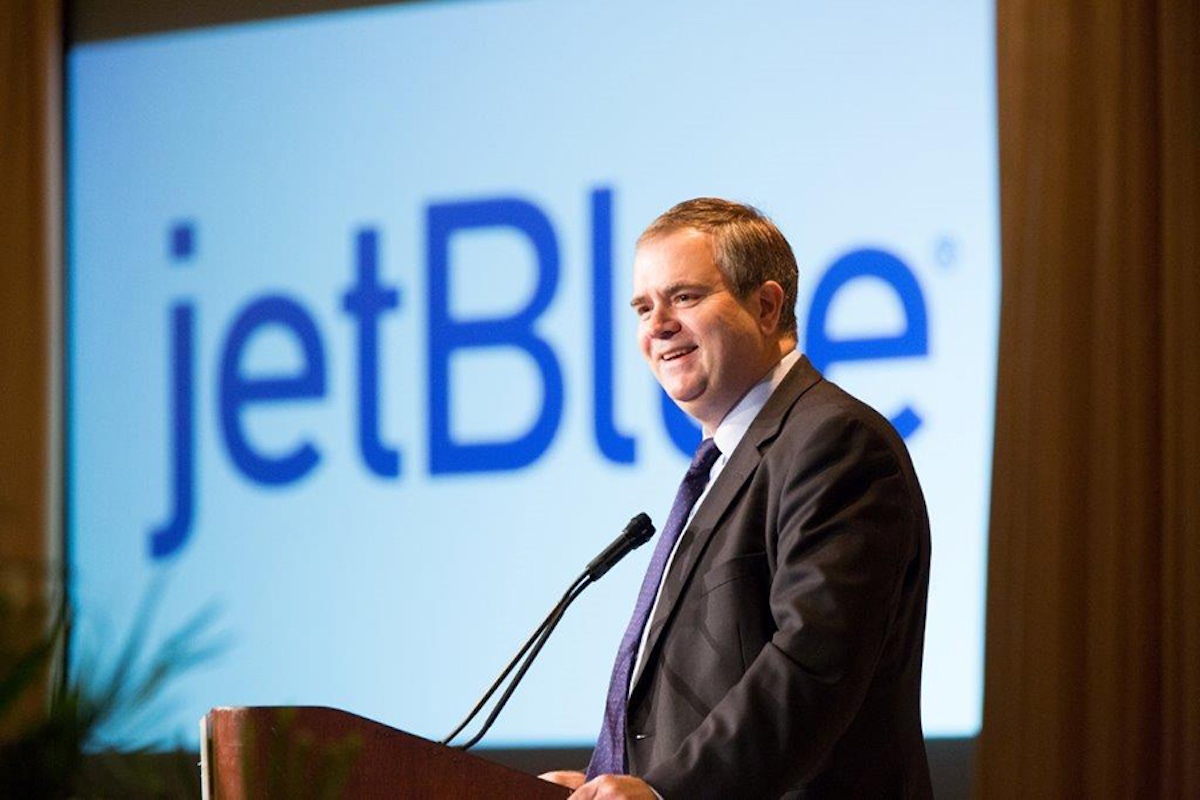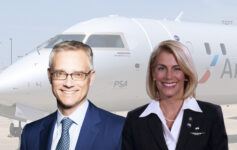
JetBlue CEO Robin Hayes has made an impassioned argument that we do not have to sacrifice great service for low fares. But nothing in life is free and his comments concerning a proposed JetBlue – Spirit Airlines merger fail to acknowledge that a combined airline will inevitably lead to higher fares.
JetBlue CEO Claims We Don’t Have To Choose Between Great Service And Low Fares…
Hayes has made his media rounds this week to discuss the surprise offer from JetBlue to acquire Spirit Airlines for $3.6 billion and create a behemoth carrier under the JetBlue banner. Hayes appeared Wednesday on CNBC’s “Squawk on the Street.”
One portion struck me in particular. He was asked about anti-competition concerns and the great overlap in route network between JetBlue and Spirit on the East Coast. Hayes insisted that passengers can have their cake and eat it too:
“What I would say is when I think about the benefits of a JetBlue Spirit transaction is that you don’t have to choose between great service and low fares. You can have both.
“I mean, we have a, a blue basic fare, which is our fare designed to attract the most price sensitive customer, but we also offer other things as well. We can offer buy ups to more bundled fares. We can offer more leg room and let’s remember Phil, even customers buying our blue basic fare, they’re getting on a JetBlue airplane. They’re going to get more legroom. They’re going to get free Wi Fi, they’re going to get free TV, they’re going to get free drinks and snacks and yes, the price is clearly important that we must always remember that. But people want more when they fly and JetBlue can bring you both.”
But nothing in life is free, and therefore it strikes me as rather disingenuous that Hayes would argue that that somehow a merged Spirit-JetBlue can continue to offer very low basic fares while still giving away immense (and valuable) free amenities that cost real money to offer.
Drinks cost money. Snacks cost money. Wi-Fi and TV costs money. The whole mission of Spirit Airlines is to unbundle everything from the price of a seat on the flight in order to offer the lowest fares.
I don’t care to fly on airline that offers horrible legroom, no power ports, limited wi-fi, and no free snacks or drinks. But I certainly appreciate the business model and recognize what a driving force it is in keeping fares in check.
Do not underestimate the so-called “Spirit Airlines Effect” on markets in which there is direct competition with legacy carriers and boutique carriers like JetBlue. Yes, JetBlue keeps legacy fares in check. But yes, Spirit Airlines keeps JetBlue fares in check.
I don’t understand how Hayes can argue with a straight face that “synergies” from a larger JetBlue will keep basic economy pricing at Spirit Airlines levels. It won’t happen. The plan is clear: eliminate competition to drive up fares.
For that reason, I am against the merger. In fact, I am against all airline mergers, but at least a Frontier-Spirit tie-up would truly create a bigger ultra-low-cost carrier that theoretically could continue to keep the pressure on other airlines to offer cheap basic fares.
CONCLUSION
The JetBlue CEO wants you to believe you can have your cake and eat it too. But we know the world does not work that way. A JetBlue-Spirit merger will inevitably lead to higher fares. Consumers may benefit when flying Spirit, but polls consistently note that most price-sensitive passengers would rather save a few bucks than enjoy JetBlue-like amenities.
image: JetBlue




Maybe Mr. Hayes was cajoling with the TV host. Trying to digest a complicated disceptation to a limited understanding assemblage.
There is ZERO reason for government intervention in a merger between a 5 % and 4% player. They already set the stage letting the big guys get together. Let the free market roam.
there is no way that this will be approved with the JB/AA “northeast alliance” in place. Under normal times, this alliance would have never been approved.
Well… They can operate now. Not sure why they think they can operate a bigger Airline. My last two flights with them were cancelled. 10 days ago & now this morning out of BOS. I’m (hopefully) flying a mint suite home & then I’m done. AA reciprocal status has been worthless. DL to the rescue again.
I agree, the media should be hammering them with hard ball questions regarding less competition and higher fares. I agree there is certainly a Spirit effect on fares in applicable markets. The media often just asks softball questions, and there are not that many purely aviation reporters left. How can a reporter be an expert on all things, they can’t.
Well said. I concur, Matthew.
Specious is a great word but almost always used by lawyers!
First to the piece’s heading: How can vigorously defending an action one just took possibly be specious? If you meant to convey that the argument was superficially plausible but flawed, that may have been a better way to put it. The word specious has an added connotation of being misleading or disingenuous.
Next is this excerpt, “ his (Hayes’) comments concerning a proposed JetBlue – Spirit Airlines merger fail to acknowledge that a combined airline will inevitably lead to higher fares.” The only logical response to such a strongly categorical statement is, “Prove it.” Can you give me 100% proof that this combined airline will automatically (inevitably) result in increased fares?
Lower costs make it easier to produce better margins, but that doesn’t automatically lead to lower fares. Businesses tend to charge what they think the market will bear. They aren’t charities.
JetBlue, like Southwest, serves a much broader portion of the overall aviation market than Spirit or Frontier. The ULCC market is generally an extremely specialized, limited, price-sensitive one. Hayes Isn’t arguing that JetBlue will keep fares at Spirt levels. He’s arguing that the merger will bring more competition to the overall marketplace. Extremely low fares that cater to the cheapest of the cheap will be Frontier and Allegiant’s job. I find it odd that Allegiant gets left out of these conversations so much of the time.
Then there’s this interesting fact. The link below is to a CNBC report on the proposed merger. At the end of the clip, it mentions that Spirit and Frontier’s market overlap is about 46.4% measured in ASMs. That compares with a 29.2% overlap between Spirit and JetBlue. I’m pretty sure the DOJ doesn’t get worked up about an airline’s perceived market segment when looking at mergers and partnerships. Its main focus is preserving competition. And competition, not low costs, is what keeps fares down. Just my opinion.
It’s an acquisition, not a merger.
The costs of the Wi-Fi is paid mostly by Amazon. The cost of drinks and snacks for the percentage of seats that would be allocated for BB fares is marginal and would be offset by the growth of routes.